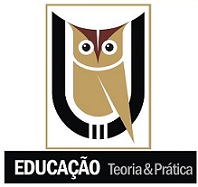PIBID COMO EXPERIÊNCIA DE FORMAÇÃO: PERSPECTIVAS DE PROFESSORES SUPERVISORES
DOI:
https://doi.org/10.18675/1981-8106.vol29.n61.p389-403Keywords:
PIBID, Formative experience, Pedagogical Innovation, Teachers SupervisorsAbstract
Is the Teaching Beginners Institutional scholarship Program (PIBID) an innovative experience? This questioning subsidizes this article that discussing if the PIBID appears as an innovative proposal from the perspective of teachers who supervise this initiative in the Ceará state. This study is linked to the network research about Teacher Professional Development and Pedagogical Innovation, supported by the Coordination
for the Improvement of Higher Education Personnel (CAPES). This is a qualitative and empirical study, which uses a semi-structured interview as data collection procedure, conducted with thirty teachers participating in the program from different teaching areas and locations in the state of Ceará. The results indicate that PIBID promotes innovative teaching practices while bringing the university closer to the school.
References
ANDRÉ, M. E. D. A.; FERRAGUT, L.; GATTI, B. A.; GIMENES, N. A. S. Um estudo avaliativo do Programa Institucional de Bolsa de Iniciação à Docência (Pibid). São Paulo: Fundação Carlos Chagas, 2014.
ANDRÉ, M. E. D. A. O Pibid deveria ser transformado em política de formação de professores. Entrevista, realizado por Ricardo Prado. Revista Veras, São Paulo, v. 5, n. 2, p. 67-77, jul./dez. 2015.
BARDIN, L. Análise de conteúdo. 4. ed. Lisboa: Edições 70, 2010.
BRASIL. Decreto nº 7.219. Dispõe sobre o PIBID – Programa Institucional de Bolsa de Iniciação à Docência. Diário Oficial da República Federativa do Brasil, Poder Executivo, Brasília/DF, 24 jun. 2010.
BRASIL. Casa Civil. Lei n° 13.415 de 16 de fevereiro de 2017. Altera as Leis nºs 9.394, de 20 de dezembro de 1996, que estabelece as diretrizes e bases da educação nacional, e 11.494, de 20 de junho 2007, que regulamenta o Fundo de Manutenção e Desenvolvimento da Educação Básica e de Valorização dos Profissionais da Educação, a Consolidação das Leis do Trabalho - CLT, aprovada pelo Decreto-Lei nº 5.452, de 1º de maio de 1943, e o Decreto-Lei nº 236, de 28 de fevereiro de 1967; revoga a Lei nº 11.161, de 5 de agosto de 2005; e institui a Política de Fomento à Implementação de Escolas de Ensino Médio em Tempo Integral. . Brasília, DF, 2007. Disponível em: < http://www2.camara.leg.br/legin/fed/lei/2017/lei-1341516-fevereiro-2017-784336-publicacaooriginal-152003-pl.html>. Acesso em: 12 dez. 2017.
BRASIL.CAPES/PIBID. Relatório e dados, 2013. Disponível em: http://www.capes.gov.br/images/stories/download/bolsas/1892014-relatorio-PIBID.pdf. Acesso em: 25 ago. 2017.
CALDAS AULETE. Minidicionário contemporâneo da língua portuguesa. Caldas Aulete. 3 ed. Rio de Janeiro: Lexikon,2011.
FARIAS, I. M. S. de. Inovação, mudança e cultura docente. Brasília: Liber Livro, 2006.
FARIAS, I. M. S. de. O que move professores a aprender? Significados e implicações do Pibid na formação continuada. In: XI ENDIPE – Encontro Nacional de Didática e Práticas de Ensino; 2012, UNICAMP, Campinas. 2012. Anais [...] Campinas, ENDIPE, 2012.
FERREIRA, A. de M. A inovação nas políticas educacionais no Brasil: Universidade e formação de professores. 2013. 305 f. Tese (Doutorado em Educação) – Universidade Federal de Goiás, Goiânia.
GARCIA, C. M. Formação de professores: para uma mudança educativa. Portugal: Porto Editora, 1999.
GATTI, B. A. A formação inicial de professores para a educação básica: as licenciaturas. Revista USP, n. 100, p. 33-46, 2014.
IMBERNÓN, F. Formação permanente do professorado: novas tendências. Tradução de Sandra TrabuccoValenzuela. São Paulo: Cortez, 2009.
LARROSA, J. Tremores: escritos sobre experiência. Tradução Cristina Antunes; João Wanderley Geraldi. 1. ed. Belo Horizonte: Autêntica, 2015.
LÜDKE, M.; CRUZ, G. B. Aproximando universidade e escola de educação básica pela pesquisa. Cadernos de Pesquisa, v. 35, n. 125, p. 81-109, mai./ago. 2005.
MESSINA, G. Mudança e inovação educacional: notas para reflexão. Cadernos de Pesquisa, n. 114, p. 225-233, 2001.
MINAYO, M. C. de S. (Org.). Pesquisa Social: Teoria, método e criatividade. 18. ed. Petrópolis: Vozes, 2001.
PIMENTA, S. G.; LIMA, S. L. Estágio e docência: diferentes concepções. Revista Poíesis. v. 3, n. 3 e 4, p.5-24, 2005/2006.
SIMIÃO, L. F. A formação docente compartilhada entre a universidade e a escola de educação básica: experiências vivenciadas no pibid. XVI ENDIPE - Encontro Nacional de Didática e Práticas de Ensino - UNICAMP - Campinas: 2012. Anais [...] Disponível em: http://www.infoteca.inf.br/endipe/smarty/templates/arquivos_template/upload_arquivos/acervo/docs/0054s.pdf. Acesso em: 25 ago. 2017.
TANCREDI, Regina Maria Simões Puccinelli. Conferência - Políticas Públicas de Formação de Professores: o PIBID em foco. Revista Exitus, v. 3. n. 1, p.13-31, jan./jun., 2013.
TARDIF, M. Saberes docentes e formação profissional. 15. ed. Petrópolis, Rio de Janeiro: Vozes, 2012.
THERRIEN, J. Parâmetros de pesquisa científica do pesquisador de sua práxis docente – articulando didática e epistemologia da prática. In: XVII ENDIPE; 2014, Fortaleza. Anais [...] Fortaleza, ENDIPE, 2014.
Published
How to Cite
Issue
Section
License
Authors who publish in this journal agree to the following terms:
a) Authors assign copyright to the journal, with the work simultaneously licensed under the Creative Commons Attribution License that allows sharing of the work with acknowledgment of authorship and publication in this journal.
b) The policy adopted by the Editorial Committee is to assign copyright only after a period of 30 months from the date of publication of the article. After this time, authors interested in publishing the same text in another work must send a letter to the Editorial Committee requesting the release of the assignment of copyright and wait for a response.
c) This journal provides public access to all its content, since this allows greater visibility and reach of published articles and reviews. For more information on this approach, visit the Public Knowledge Project, a project that developed this system to improve the academic and public quality of research, by distributing OJS as well as other software to support the public access publication system to academic sources. The names and email addresses on this website will be used exclusively for the purposes of the journal and will not be available for other purposes. This journal provides open any other party  This work is licensed under a Creative Commons License
This work is licensed under a Creative Commons License











